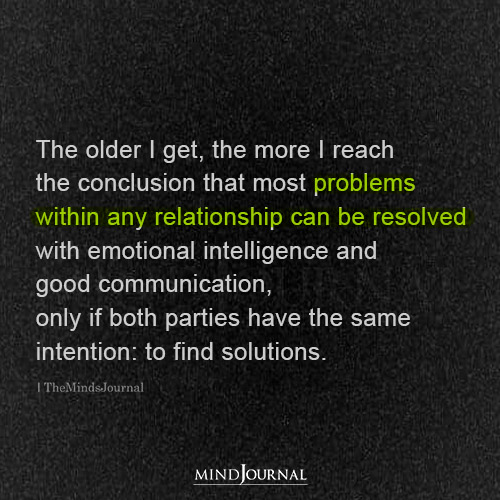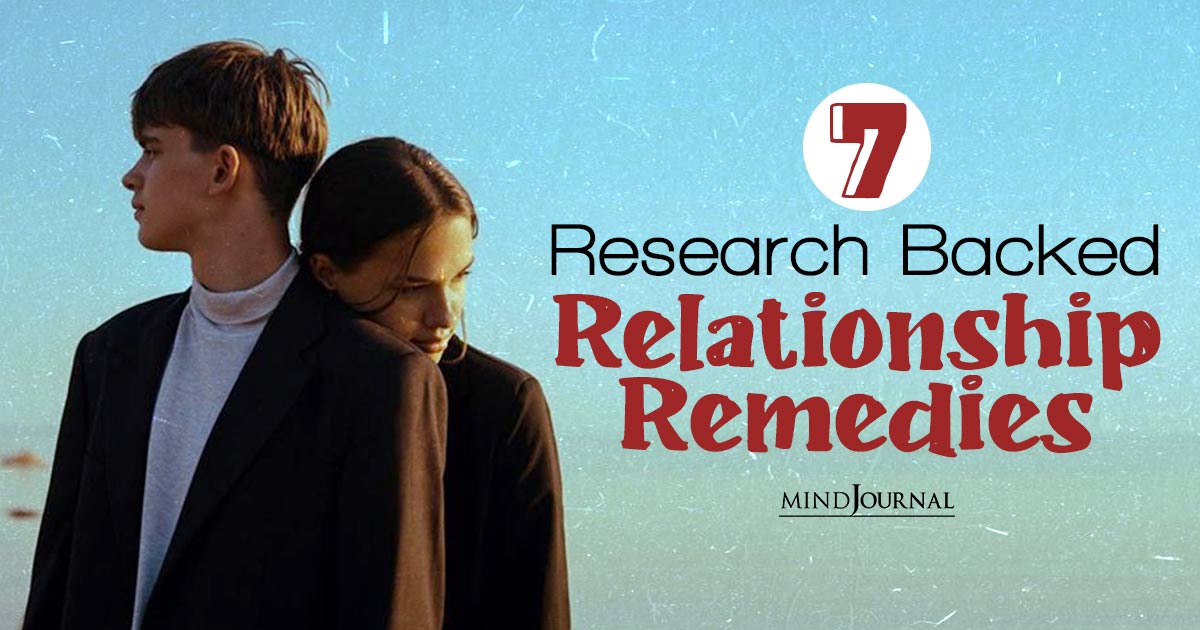When it comes to dealing with relationship problems, science can prove to be really helpful and can provide you with some substantial research-backed relationship remedies. This article is going to talk about some of the most effective and useful relationship remedies that can make a huge difference to your relationship.
You may think these should go without saying, but in my personal and professional experience, they have not.
7 Research Backed Relationship Remedies
1. Be Quick to Repair Injury
One day, my wife sensed my odd vibe, I didn’t like her asking, and it grew from there. We both got mad, and she went to our bedroom and shut the door. After a little while, I wrote a note about how much I loved her and slid it under the door. Before too long, the tension lifted.
Our quick surges from anxiety to embattlement lead us nowhere good when we become stuck in dynamics revolving around momentary self-interest.
Zig Ziglar said it best, “Be careful not to compromise what you want most for what you want now.” Yet sometimes we do compromise what we want most. Renowned relationship researcher Dr. John Gottman has found that relationship masters aren’t so because they’re conflict-free but because they make amends “early and often.”
Related: Unlocking The Secrets To A Happy Relationship: 13 Science-Backed Tips
2. Try a Little Tenderness
Baylor University research professor, Dr. Keith Sanford studied perception of emotion in couple relationships, calling emotions perceived as asserting power “hard” and emotions perceived as expressing vulnerability “soft.”
Sanford found that when one partner observed an increase in “hard” emotion from the other, anxiety rose as a result of perceiving a threat to control, power, or status in the relationship; when one observed a decrease in “soft” emotion or an increase in what Sanford called “flat” emotion, anxiety rose as a result of perceiving emotional neglect.
Hard and soft emotions react in a reflexive fashion to perceived threats and neglect in a nearly moment-by-moment chain reaction. Sanford has instructed, “What you perceive your partner to be feeling influences different types of thoughts, feelings, and reactions in yourself, whether or not what you perceive is actually correct.”
Yet we’re a glutton for our own perceptions, aren’t we? Perhaps rather than relying on the unreliable, we should simply heed Otis Redding’s sage advice and “try a little tenderness.”
3. Seek First to Understand
Arguments drenched in defending, criticizing, and debating facts constitute what I call tailspin, which leads to resentment and emotional paralysis. Understanding is thwarted, and cold distance permeates.
It’s not easy to listen humbly and negotiate vulnerably through the tremble of raw emotion. Nevertheless, when empathy is experienced, togetherness is more likely to be experienced, even in conflict.
Dr. Sue Johnson, a leading expert on couples therapy, has written of fighting couples, “Both are terrified; they are just dealing with it differently. Trouble is, once they start this blame-distance loop, it confirms all their fears and adds to their sense of isolation.”
On the other hand, when we listen to understand, we gain perspective, promote mutuality, and catalyze what I call liftoff.
4. Tailor Your Affections
Relationship educator Dr. Gary Chapman identified five ways that we show love for one another: words of affirmation, acts of service, giving gifts, quality time, and physical touch.
Chapman contends that we are wired to give and receive affection best in one or two ways. When we show love in our partner’s unique language, we maximize the impact of our affections and fortify a secure base.
The alternative? W.L. Bateman put it quite well—“If you keep doing what you’ve always done, you’ll keep getting what you’ve always got.”
Related: 7 Psychological Strategies That Will Make Your Relationship Stronger
5. Let Your Pride Fall Down, Be Emotionally Responsive
One night early in our marriage, I got in my wife’s side of the bed. I didn’t think we needed “sides.” But she liked how we each had our own side of the bed. She got really frustrated, saying she wouldn’t sleep on my side. I refused to budge, and she slept on the floor.
Our peace is as fragile as our pride is impenetrable. Being emotionally responsive is about understanding and meaningfully responding to the individualized needs of our particular partner in moments of need.
Dr. Ted Huston at the University of Texas studied predictors of divorce and concluded, “When marriages fail, it is not increasing conflict that is the cause. It is decreasing affection and decreasing emotional responsiveness.”
6. Subvert Self, Empower Relationship
Stampedes are generated when psychological panic triggers physiological startle. Startle in one promotes panic in another, and so on. People aren’t so different.
There is a positive feedback loop between beliefs and behavior—if enough people believe something is true, their behavior can make it true, and observations of their behavior may, in turn, increase belief. A classic example is a bank run.
You may be more familiar with the phrase “self-fulfilling prophecy.” Where self-interest reigns, relationship problems run the risk of becoming vicious cycles. The perceived provocations and failures of the ones we love have the power to overwhelm us and paralyze intimacy.
Acclaimed couples therapist Terry Real has cautioned, “Too often we move from personal disempowerment to personal empowerment. We must learn to cultivate relational empowerment.”

7. Act in Spite of Impulsive Emotion, Rather than at its Whim
When we allow insecurity, panic, anger, or despair to decide, a primal fight-or-flight instinct trumps our capacity for empathy and negotiation. To the extent we fail to go toe-to-toe with our own emotional impulses, they’ll go toe-to-toe with the ones we love.
Relationship guru, Dr. David Schnarch, concluded, “If you can’t regulate your own emotional temperature, you’ll regulate everyone around you to keep yourself comfortable.”
Related: The Magic Relationship Ratio, According to Science
When the positive end of one magnet is placed against the negative end of another, an invisible force pulls them together. When the magnet’s positive end is placed against the positive end of another, they repel one another.
Couples must develop freedom within the felt pushes and pulls of powerful emotions in their relationships.
Want to know more about relationship remedies? Check this video out below!
References:
Chapman, G. (2015). The five love languages: The secret to love that lasts. Chicago, IL: Northfield Publishing. Gottman, J., Silver, N. (1999). The seven principles for making marriage work. New York: Three Rivers Press. Huston, T., Caughlin, J., Houts, R., Smith, S., & George, L. (2001). The connubial crucible: Newlywed years as predictors of marital delight, distress, and divorce. Journal of Personality and Social Psychology, 80, 237-252. Johnson, S. (2008). Hold me tight: Seven conversations for a lifetime of love. New York, NY: Little, Brown and Company. Real, T. (2011, March 18). The new rules of marriage. Worldwide teleconference: GoodTherapy.org. Sanford, K. (2007). Hard and soft emotion during conflict: Investigating married couples and other relationships. Personal Relationships, 14, 65-90. Schnarch, D. (2009). Intimacy and desire: Awaken the passion in your relationship. New York: Beaufort Books.
Copyright @ Blake Griffin Edwards
Written By Blake Griffin Edwards This article was also published at Psychology Today










Leave a Reply